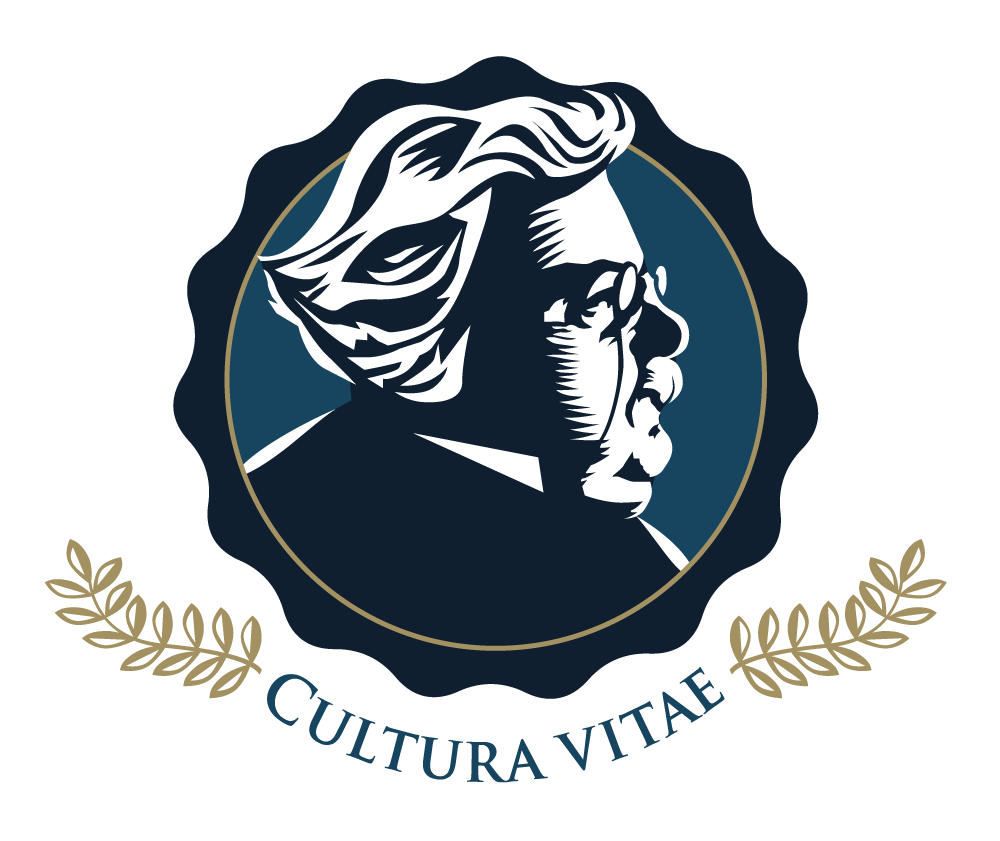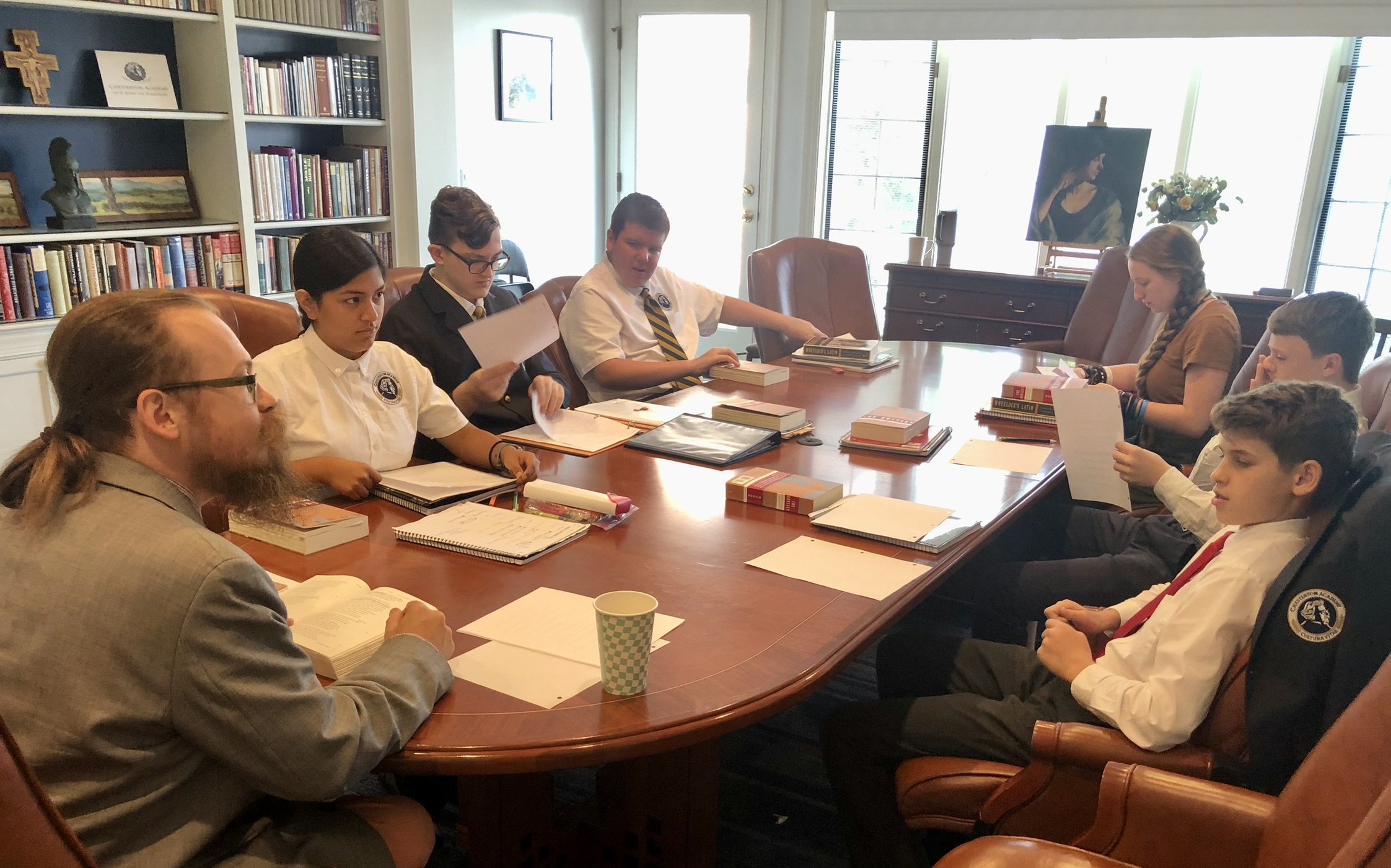Headmaster’s Perspective - The First Two Weeks at CASJE: From Plato to Ping Pong, and Many Things In Between
What exactly goes on at a classical high school joyfully rooted in the Catholic faith? It indeed looks different from a typical high school, in the most wonderful and inspiring ways. During their first two weeks at Chesterton Academy of St. John the Evangelist, our students got their first taste of the subjects they will be studying this year. In addition to the courses described below, the students began the rhythm of attending daily Mass, affording them the true gift of daily access to the Eucharist, the source and summit of the Christian life. The Sacrament of Reconciliation was also available to them following one of the Masses. Nourished by these Sacraments, the students and faculty returned to school each day to embark on their learning journey in the following ten areas:
(1) Euclidean Geometry: The definitions of Euclid's Elements were the focus of much thoughtful discussion. The students also pondered the idea that there must be self-evident first principles--unproven starting points of our knowledge--from which we reason in order to attain proven knowledge. Once they have discussed Euclid's Postulates and Common Notions, the students will be going to the board to demonstrate Euclid's Propositions.
(2) Literature: The students have gotten acquainted with some of the principal characters in Homer's Odyssey. In particular, they spent time discussing the difficult position of young Telemachus, who longs for his father Odysseus' return after twenty years, and is spurred by Athena to take action in his absence.
(3) Philosophy: After wrestling with the question, "What is philosophy?", the students had their first encounter with Socrates in Plato's Meno where Socrates and Meno struggle to define virtue and how it is acquired. By working through the inadequate definitions offered by Meno, it has become clear that a definition must be one, universal, and have terms that are better known than the word being defined.
(4) Latin: In principio erat Verbum (In the beginning was the Word) are the first words of John's Gospel, and our study of Latin appropriately began by analyzing the six characteristics of a verb: person, number, tense, mood, voice, and aspect.
(5) Biology: The students have begun their foray into the study of living things and their sensory systems by learning Aristotle's position on the primacy of sight over the other senses, so crucial to the development of budding natural scientists.
(6) Theology: The students have tackled two common questions Catholics often field from their Protestant brethren: "Where is that in the Bible?" and "How can the Catholic Church teach X when the Bible says Y?" Through these questions, they have begun considering the role of Sacred Scripture in the Catholic Faith.
(7) History: With the help of Herodotus, who is known as the Father of History, the students discussed the first questions that confront a student of history: What is the subject matter of history? What degree of certitude might we hope to gain? Where do we begin our study? And how do we handle the problem of bias?
(8) Music: The students learned the fundamentals of Gregorian chant, including notation, solfeggio (Do-Re-Mi), and rhythm. They also spent some time in class learning good singing techniques and basic ear training.
(9) Art: The students were introduced to art terms, and they discussed the meaning of beauty and the purpose of visual art. They also practiced observational drawing from nature using three types of leaves. They did so on our school's sunlit patio on a beautiful afternoon.
(10) Taekwondo: The students took their first steps toward the goal of improving their strength, posture, flexibility, and stamina, but also developing self-control, courtesy, and concentration.
As the days progressed in these first two weeks, so too did the sharing, laughter, and connection among the students and between students and faculty. Beyond the rich classroom discussions, fellowship and recreation were enjoyed on the breaks in the form of ping pong, lunching together on the patio, and sharing a game of chess, all of which was punctuated by familiar tunes being dabbled on the rec room piano by one of our musically inclined students. This sense of authentic friendship and camaraderie being forged is precisely the "joyfully Catholic" environment espoused by the Chesterton Schools Network and that the founding board envisioned. We offer all thanks and praise to God for the conclusion of these very positive first two weeks and are genuinely inspired to see what the Holy Spirit has ordained for us in this year ahead.

